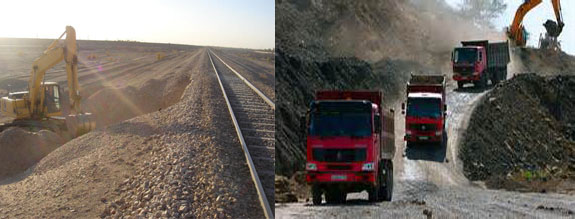Transit, Important but Often Ignored Priority
Introduction:
In order to start construction of the railroad between Afghanistan, Tajikistan and Turkmenistan a second meeting was held in Dushanbe, the capital city of Tajikistan. In the meeting 635-kilometer of mainstream and 160-kilometers secondary route was approved. The railway construction was originally approved during the trilateral summit of the presidents of three countries in May, 2013.
In the second trilateral summit participants agreed to start the work of construction of both railroads simultaneously, and the construction of the secondary route will be completed within three years costing 240 million US dollars, which would be a good source of transit income for Afghanistan. CSRS’ Weekly Analysis Board has discussed this topic in the current issue as following:
Dependence on Foreign Aid and Lost Opportunities:
In last one decade, lack of an efficient and comprehensive economic strategy, low capacity in public and private sectors, insecurity, lack of good governance and presence of widespread corruption, lack of attention to economic foundations like electricity, gas, railroads, transit highways and major airports and some other challenges were raising as barriers to economic development.
According to economists, the Afghanistan National Developmental Strategy (ANDS), despite having weaknesses was not considerably implemented as a national development plan and remained in papers only.
In last one decade Afghanistan almost entirely relied on foreign aid, while the donors have provided funds for specific goals, sometimes foreign aid proved to be effective such as after the World War Two foreign aid was effective for the development of Europe according to the Marshal Plan. While in Afghanistan the aid did not have proven impact which could be due to its political nature rather than economic amongst other reasons.
Some economists believe that Afghanistan will not reach a stable and sustainable economic development until they find an efficient and comprehensive Afghan solution; Firstly they should have sought for sources of income leading to a balance in the national budget and after that they should have worked on a national economic strategy highlighting Afghanistan’s economic vision in the short and long runs.
The management of the water flowing under micro-hydro power (MHP) dams and modernization, mechanization and development of agriculture for a sustainable economic development as priority is one of the issues that economists called it as a lost opportunity. Since potential capacities, such as human resources, enough water and land on one hand and little need for security, energy and capacity in this field on the other hand show that development in this field was possible.
Potential Opportunities for Transit and Latest Projects:
Transit has a significant role in income of all countries, but in Afghanistan the inefficiency in this area is due to abusive regional competitions, insecurity, lack of transit regulating authorities, weak governance and widespread corruption. From geoeconomic point of view Afghanistan has important location for transit, the Silk Route can be one of its examples which was important since ancient times and now with the economic developments and raising economic capacities in Asia hopes for reactivation of this route rose again. Silk Route is often discussed in international gatherings, while the Afghan government hasn’t ever innovatively brought this into consideration of international community. The government should work on this kind of projects as a priority and renovate the geoeconomic and geostrategic location of Afghanistan especially for transit and transportations opportunities.
Projects such as Silk Route, Electricity and Gas transit and railways, which have often been mentioned by the government and international community to start work on, have major economic and political value. Since Afghanistan is completely ready for the execution of such huge regional economic projects which obviously cause economic and political stability and social welfare in the region, Afghan government should consider them as its priority.

